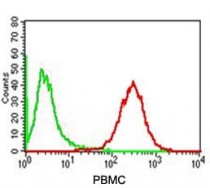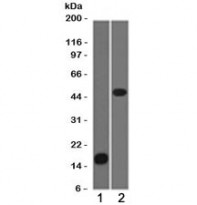ARG56206
anti-Adipophilin antibody [ADPN1-1]
anti-Adipophilin antibody [ADPN1-1] for Flow cytometry,Western blot and Human
Overview
| Product Description | Mouse Monoclonal antibody [ADPN1-1] recognizes Adipophilin |
|---|---|
| Tested Reactivity | Hu |
| Tested Application | FACS, WB |
| Host | Mouse |
| Clonality | Monoclonal |
| Clone | ADPN1-1 |
| Isotype | IgG2b, kappa |
| Target Name | Adipophilin |
| Antigen Species | Human |
| Immunogen | A human partial recombinant Adipophilin. |
| Conjugation | Un-conjugated |
| Alternate Names | ADRP; Adipophilin; Adipose differentiation-related protein; ADFP; Perilipin-2 |
Application Instructions
| Application Suggestion |
|
||||||
|---|---|---|---|---|---|---|---|
| Application Note | * The dilutions indicate recommended starting dilutions and the optimal dilutions or concentrations should be determined by the scientist. |
Properties
| Form | Liquid |
|---|---|
| Purification | Purification with Protein G. |
| Buffer | PBS (pH 7.4), 0.05% Sodium azide and 0.1 mg/ml BSA. |
| Preservative | 0.05% Sodium azide |
| Stabilizer | 0.1 mg/ml BSA |
| Concentration | 0.2 mg/ml |
| Storage Instruction | For continuous use, store undiluted antibody at 2-8°C for up to a week. For long-term storage, aliquot and store at -20°C or below. Storage in frost free freezers is not recommended. Avoid repeated freeze/thaw cycles. Suggest spin the vial prior to opening. The antibody solution should be gently mixed before use. |
| Note | For laboratory research only, not for drug, diagnostic or other use. |
Bioinformation
| Database Links | |
|---|---|
| Gene Symbol | PLIN2 |
| Gene Full Name | perilipin 2 |
| Background | The protein encoded by this gene belongs to the perilipin family, members of which coat intracellular lipid storage droplets. This protein is associated with the lipid globule surface membrane material, and maybe involved in development and maintenance of adipose tissue. However, it is not restricted to adipocytes as previously thought, but is found in a wide range of cultured cell lines, including fibroblasts, endothelial and epithelial cells, and tissues, such as lactating mammary gland, adrenal cortex, Sertoli and Leydig cells, and hepatocytes in alcoholic liver cirrhosis, suggesting that it may serve as a marker of lipid accumulation in diverse cell types and diseases. Alternatively spliced transcript variants have been found for this gene. [provided by RefSeq, Mar 2011] |
| Function | May be involved in development and maintenance of adipose tissue. [UniProt] |
| Cellular Localization | Cytoplasmic |
| Highlight | Related products: Anti-Mouse IgG secondary antibodies; Related news: A new role of fat – factory of circulating miRNAs |
| Calculated MW | 48 kDa |
| PTM | Acylated; primarily with C14, C16 and C18 fatty acids. |
Images (2) Click the Picture to Zoom In
-
ARG56206 anti-Adipophilin antibody [ADPN1-1] FACS image
Flow Cytometry: Human PBMC stained with ARG56206 anti-Adipophilin antibody [ADPN1-1] (red) and isotype control (green).
-
ARG56206 anti-Adipophilin antibody [ADPN1-1] WB image
Western blot: 1) Partial recombinant protein and 2) Jurkat cell lysate stained with ARG56206 anti-Adipophilin antibody [ADPN1-1].







